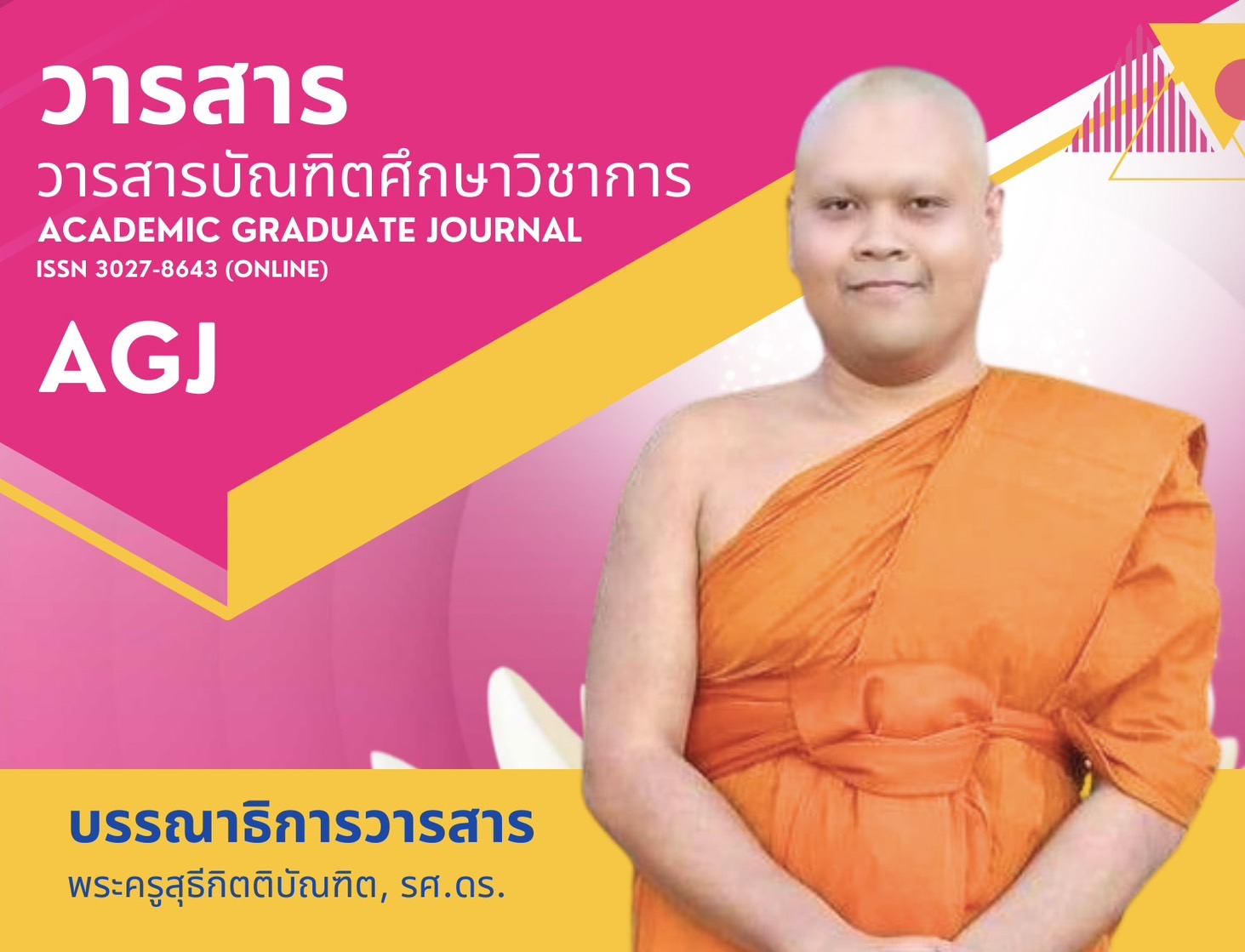BUDDHISM-BASED POLITICAL COMMUNICATION OF BUDDHADASA BHIKKHU
Keywords:
Political Communication, Buddhadharma, Buddhadasa BhikkhuAbstract
The objective of this academic article is to analyse political communication according to Buddhadharma of Buddhadasa Bhikkhu by referring to political communication, the use of Buddhadharma in politics and political communication according to Buddhadharma of Buddhadasa Bhikkhu. Buddhadasa Bhikkhu, as a source, is reckoned as a monk who has a vital role in using Buddhadharma in politics by applying or implementing Buddhist principles for the best benefits of society as a whole in order to improve the quality of life and the human spirit through various media or channels such as preaching through multiple channels including preaching at temples, on television, radio and print media. Buddhadasa Bhikkhu gave importance to morality, which is the thing that protects and maintains peace in society and leads humans through political crises. The political communication approach of Buddhadasa Bhikkhu needed to specify precisely what type of political regime was best and suitable for Thai society at that time. Still, he did give broad principles about what good politics should look like. He wants people to pay attention to Dhamma so that they have morality. When everyone has morality in their lives, any form of political system is possible for the benefit of all citizens. The Dhamma principles that correspond to such approaches are: 1. Ràjadhamma: virtues or duties of the king; 2. Aparihãniyadhamma: things leading never to decline but only to prosperity; 3. Brahmavihàra: Holy Abidings, 4. Sàraõãyadhamma: states of conciliation, 5. Dhammàdhipateyya: supremacy of the Dhamma or righteousness, and 6. Diññhadham mikattha-sa§vattanika-dhamma: virtues conducive to benefits in the present. Political communication, according to the Buddhadharma of Buddhadasa Bhikkhu, is, therefore, a framework for using Buddhism to lead politics or social development based on Buddhadharma. Thus, the messages that he communicated can be adapted to suit the current social context, which depends on the attitude and vision of the receivers and how they would apply the principles to bring maximum benefit to society.
References
ธีระวุฒิ อรุณเวช. (2554). กระบวนการพัฒนาสังคมสู่ความอยู่เย็นเป็นสุขในระดับพื้นที่บนฐานพุทธธรรม. สืบค้น 7 สิงหาคม 2567, จาก https://www.m-society.go.th/ewtadmin/ewt/mso_web/article_attach/8937/11106.doc.
พระพรรณธานุพงศ์ มุ่งหมาย และคณะ. (2563). การประยุกต์ใช้หลักพุทธธรรมเพื่อการส่งเสริมโครงการรักนวลสงวนตัว ของนักเรียนโรงเรียนปรางค์กู่ อำเภอปรางค์กู่ จังหวัดศรีสะเกษ. วารสารบัณฑิตสาเกตปริทรรศน์, 5(1), 44-56.
พระสุภาพร เตชธโร และพระมหามฆวินทร์ ปุริสุตฺตโม. (2562). บทวิจารณ์หนังสือ เรื่อง ธรรมิกสังคมนิยม DHAMMIC SOCIALISM เขียนโดย พุทธทาสภิกขุ. วารสารชัยภูมิปริทรรศน์, 2(3), 10-20.
พุทธทาสภิกขุ. (2531). การเมืองคือธรรมะ. กรุงเทพฯ: สำนักพิมพ์อรุณวิทยา.
_______ . (2538). ศีลธรรมกับมนุษยโลก (พิมพ์ครั้งที่ 2). สุราษฎร์ธานี: ธรรมทานมูลนิธิ.
_______ . (2546). ธรรมะกับการเมือง (พิมพ์ครั้งที่ 2). สุราษฎร์ธานี: ธรรมทานมูลนิธิ.
_______ . (2548). ธัมมิกสังคมนิยม. กรุงเทพฯ: สำนักพิมพ์สุขภาพใจ.
_______ . (2566). แจกมรดกพุทธทาส. นนทบุรี: มูลนิธิสวนแก้ว.
มงคลชัย วิริยะพินิจ. (2566). มองวัฒนธรรม สู่การจัดการความรู้ (พิมพ์ครั้งที่ 2). กรุงเทพฯ: สำนักพิมพ์จุฬาลงกรณ์มหาวิทยาลัย.
วริยา ชินวรรโณ และฐิตารีย์ ศิริศรีษรชัย. (2558). จริยธรรมในวิชาชีพนักการเมือง. นครปฐม: สำนักพิมพ์มหาวิทยาลัยมหิดล.
วันพัฒน์ ยังมีวิทยา. (2560). พุทธทาสกับการให้ความชอบธรรมต่ออุดมการณ์แห่งรัฐไทย. วารสารสังคมศาสตร์ มหาวิทยาลัยนเรศวร, 13(1), 181-224.
สมคิด คำบอน. (2552). แนวคิดธัมมิกสังคมนิยมของท่านพุทธทาสภิกขุกับการพัฒนาประชาธิปไตย (วิทยานิพนธ์ปริญญารัฐศาสตรมหาบัณฑิต สาขาวิชารัฐศาสตร์). นนทบุรี: มหาวิทยาลัยสุโขทัยธรรมาธิราช.
สุภาพรรณ ณ บางช้าง และคณะ. (2527). การประยุกต์หลักพุทธธรรมมาใช้ในการพัฒนาชนบท. กรุงเทพฯ: โรงพิมพ์จุฬาลงกรณ์มหาวิทยาลัย.
สุรพล สุยะพรหม และนันทนา นันทวโรภาส. (2562). การสื่อสารทางการเมืองของพระเทพปฏิภาณวาที (เจ้าคุณพิพิธ): ศึกษาในช่วงเวลา พ.ศ. 2540-2560. วารสารมหาจุฬานาครทรรศน์, 6(5), 2501-2518.
สุรพล สุยะพรหม. (2560). ความคิดทางการเมืองตามแนวพระพุทธศาสนาของพุทธทาสภิกขุ. สืบค้น 7 สิงหาคม 2567, จาก https://gps.mcu.ac.th/wp-content/uploads/2017/05/ความคิดทางการเมืองตามแนวพระพุทธศาสนา.pdf
Berlo, D. K. (1960). The Process of Communication; An Introduction to Theory and Practice. San Francisco: Rinehart Press.
McNair, B. (2007). An Introduction to Political Communication (4th ed.). New York: Routledge.
Mueller, C. (1973). The politics of communication: a study in the political sociology of language, socialisation, and legitimating. London: Oxford University Press.







